- Faculty News
- Student News
- Lab News
- Publications
- Meetings and Presentations
- Outreach
- Grants
- Announcements
- About This Newsletter
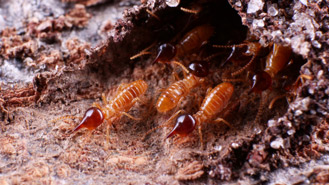
ABOVE: The conehead termite, Nasutitermes corniger (Motschulsky) is a species found through the Caribbean and parts of South America. Discovered in South Florida in 2001, it is currently under a state program of eradication. The species is now restricted to very small residual pockets in Broward County, Florida. Photo: Dr. Thomas Chouvenc.
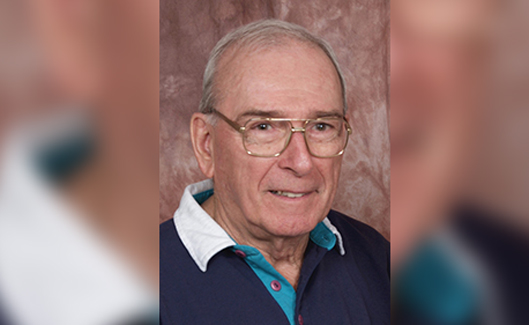
ABOVE: Congratulations Dr. David Dame! Dr. Dame was a USDA Research Entomologist, an adjunct professor at UF, and was elected Fellow of the Entomological Society of America. His distinguished career includes recognition for his contribution to the development of environmentally friendly control measures targeted at insect-borne disease vectors and he is recognized as a pioneer of the sterile insect technique for mosquitoes and tsetse fly control.

The first book on the Asian citrus psyllid (ACP) and huanglongbing (HLB) edited by Dr. Jawwad Qureshi and Dr. Phil Stansly was recently published by the Center for Agriculture and Biosciences International (CAB International). This book, written by a team of experts on the Asian citrus psyllid, gathers together everything currently known about the biology and ecology of this important pest species, examines the transmission and acquisition processes of the pathogen, and looks at current management practices and their effectiveness. The potential for new, innovative management techniques are also described along with the economic implications of managing this rapidly establishing disease. This book presents a great source of knowledge for researchers of entomology and related disciplines, students, agricultural scientists and professionals, extension agents, and pest management consultants. https://www.cabi.org/bookshop/book/9781786394088/

Pi Chi Omega, pichiomega.org, is an international organization of pest management professionals and researchers who promote professionalism in the pest management industry. Their charge is to further the science of pest management.
The organization began awarding scholarships in 1976, and since then, 20 University of Florida students have been the recipients of PCO scholarships for their research in urban pest management. Many of the scholar recipients are currently leaders in urban pest management industries, associations, regulation, government research, and academia. University of Florida urban entomology students supported by these scholarships include:
2018-19 Johnalyn Gordon-Halbritter
2016-17 Brittany DeLong Campbell
2016-17 Johnalyn Gordon
2013-14 Ben Hottel
2011-12 Amanda Eiden
2010-11 Stephanie Larrick Hill
2005-07 Ricky Vazquez
2004-05 Joseph Smith
2002-03 Matt Aubuchon
2002-04 Rebecca Baldwin
2001-02 Shawn Brooks
2001-02 Cynthia Tucker
2000-01 Deanna Branscome
1999-00 Clay Scherer
1998-99 Jerry Gahlhoff
1998-99 Tim McCoy
1998-00 Dina Richman
1995-97 Dini Miller
1992-94 Daniel R. Suiter
1990-91 Nancy C. Hinkle

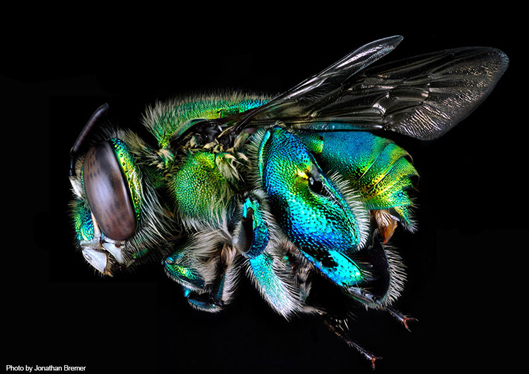
ABOVE: Florida Museum opened the "Invisible Insects" exhibit on October 3rd, 2020. This exhibit showcases work from a project in Dr. Jaret Daniels' lab with photography by Jon Bremer. Come see it in West Gallery!

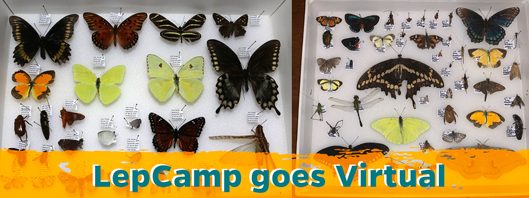
ABOVE: Dr. Andrei Sourakov and the Florida Museum held their first virtual LepCamp in August! Read more about it here: https://www.floridamuseum.ufl.edu/andrei-sourakov/activities/lepcamp-goes-virtual/

NEW blog by Dr. Andrei Sourakov titled “Catapillars more than meets the eye” Read the full blog here: https://www.floridamuseum.ufl.edu/andrei-sourakov/activities/caterpillars-more-than-meets-the-eye/

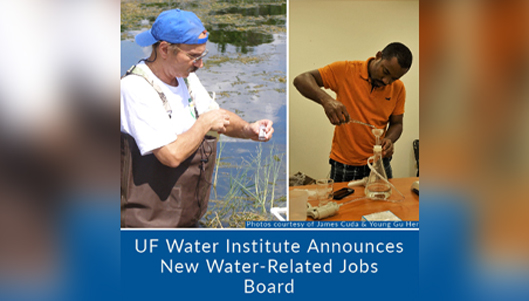
ABOVE: Dr. James P. Cuda and his biocontrol research on hydrilla are featured on the cover of the UF Water Institute’s new webpage dedicated to water-related job postings. See: https://waterinstitute.ufl.edu/6894-2/.

ABOVE: Welcome NEW postdoc Eric Middleton! Eric is joining Dr. Lauren Diepenbrock’s lab at the Citrus Research and Education Center in Lake Alfred. His project will focus on developing management options for the lebbeck mealybug in Florida citrus. Lebbeck mealybug causes direct damage to fruit, leaves, and stems with the potential to kill young trees. It has now been found in commercial groves in ten counties as well as homeowner plantings in 2 counties. His project is funded by the Citrus Research and Development Foundation (CRDF) and will be aimed at providing timely management information to our citrus growers.


Congratulations to Octavio Menocal, a Ph.D. student at the UF/IFAS/Tropical Research and Education Center (TREC). Octavio was one of the recipients of the 2020 Tropical Fruit Growers of South Florida’s tropical fruit research scholarship initiative. This award was given to Octavio based on his current work “Effect of canopy management and weather conditions on ambrosia beetle abundance in laurel wilt affected avocado orchards”. This scholarship is awarded to students working on issues related to the tropical fruit industry in Miami-Dade County. Octavio’s advisor is Dr. Daniel Carrillo.
Need to name that bug? A host of experts are available to help Floridians identify any insect or related arthropod. If a mystery creature has six or more legs, the UF Insect ID Lab is the place to call.

ABOVE:
Mushrooms attract an interesting set of insects. Dr. Andrei Sourakov shared some images he took during a recent trip to San Felasco Hammock Preserve State Park. These images feature a red bull assassin bug (Repipta taurus (Fabricius)) hunting Mycodrosophila flies on a mushroom.
If you need insect images for a publication or presentation for your UF/IFAS Extension or teaching work, you can go to this direct link, pictures are copyrighted material and intended for official UF use only. Log onto the website using your Gatorlink credentials.
Lyle Buss is the UF/IFAS Insect ID Lab manager.

Think it might be a nematode problem? The Nematode Assay Laboratory serves Florida and other states by providing nematode assays and expert advice regarding nematode management.
For more information on the Nematode Assay Laboratory, please contact the lab manager Dr. Billy Crow.
Avery PB, Kumar V, Francis A, McKenzie CL, Osborne LS. 2020. Compatibility of the predatory beetle, Delphastus catalinae with an entomopathogenic fungus, Cordyceps fumosorosea for biocontrol of invasive pepper whitefly, Aleurotrachelus trachoides. Insects 11:590.
Fife A, Bolton S, Griesheimer JL, Paret M, Martini X. 2020. First report of Phyllocoptes fructiphilus Keifer (Eriophyidae), the vector of the Rose Rosette Virus, in Florida, USA. Florida Entomologist 103:411-414.
Gordon JM, Šobotník J, Chouvenc T. 2020. Colony‐age‐dependent variation in cuticular hydrocarbon profiles in subterranean termite colonies. Ecology and Evolution, 10:10095-10104.
Halbert SE, and Burckhardt D. 2020. The psyllids (Hemiptera: Psylloidea) of Florida: newly established and rarely collected taxa and checklist. Insecta Mundi 0788:1-88. https://centerforsystematicentomology.org/insectamundi/0788_Halbertand
Burckhardt_2020.pdf.
Kumar V, McKenzie CL, Avery PB, Osborne LS. 2020. Suitability of ornamental pepper cultivars as a banker plant for establishment of predatory mite Amblyseius swirskii in controlled production. Sustainability 12:8031.
Sourakov A, Doll CF, Quinn AM, Xiao L, Anderson E. 2020. On speciation and hybridization among closely related species: establishing an experimental breeding lineage between two species of Automeris Hübner moths (Lepidoptera: Saturniidae) and implications for taxonomy. Insecta Mundi 0797:1-16.
Maron JL, Hahn PG, Hajek KL, Pearson DE. 2020. Trade-offs between seed size and biotic interactions contribute to coexistence of co-occurring species that vary in fecundity. Journal of Ecology.
Reeves LE, Daniels JC. 2020. Conservation value of secondary forest habitats to endemic frugivorous butterflies at Mount Kanlaon, Negros Occidental, Philippines. Journal of Insect Conservation. https://doi.org/10.1007/s10841-020-00263-x.
Thompson V, Halbert SE, Rothschild M. 2020. A new species of the spittlebug genus Clastoptera Germar (Hemiptera: Cercopoidea: Clastopteridae) on Florida oaks. Insecta Mundi 0796:1-16. https://centerforsystematicentomology.org/insectamundi/0796_Thompson_et
al_2020.pdf.

New on Featured Creatures:
Alligatorweed stem borer, Arcola malloi Pastrana.Written by Bonnie C. Wells and Carey Minteer.
Do you have a favorite creature? Learn how to make it into a Featured Creatures!
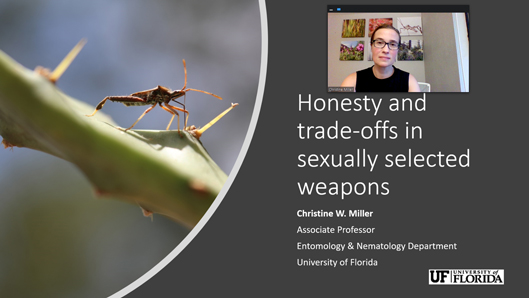
ABOVE: Dr. Christine W. Miller spoke on “Honesty and trade-offs in sexually selected weapons” at both the University of Oklahoma and the University of Houston on September 16th. Her seminar and meetings with faculty and students were virtual.

Dr. James P. Cuda, Dr. Norman C. Leppla, Dr. Tolulope Morawo, and Dr. Sriyanka Lahiri participated in the Regional Project Virtual Meeting held on September 29th.
Dr. James P. Cuda, the current FAES official representative for the Regional Project, was invited to give a brief Zoom presentation highlighting recent accomplishments of Florida’s participants in the Hatch Multistate Project S1073 titled “Biological Control of Arthropod Pests and Weeds”.
Dr. James P. Cuda participated in the virtual Invasion Science Workshop held on October 2nd. The purpose of the workshop was to “create a shared vision for invasion science at UF.”
Dr. James P. Cuda developed two training modules: one on invasive species management and the other on biological control in the buffer zone. They were beta tested by 26 students enrolled in the Healthy Ponds Certification Program that was launched in Sarasota County, on September 21st.
Dr. James P. Cuda was an invited speaker for the 2020 virtual Annual Conference of the North American Invasive Species Management Association on October 6th to the 8th. Cuda gave a presentation titled, “Orseolia javanica, a Potential Biological Control Agent of Cogongrass, Imperata cylindrica”.

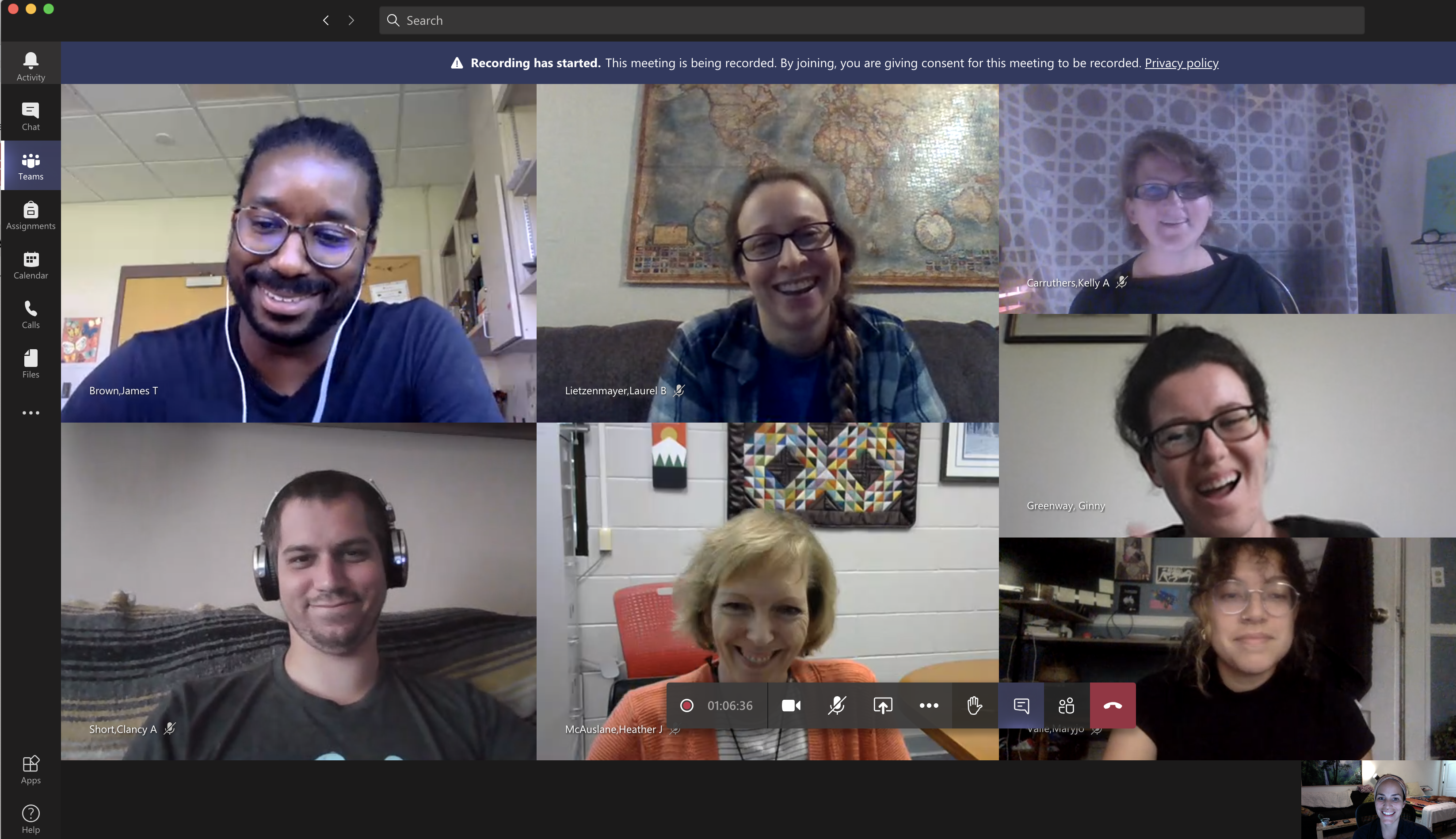
ABOVE: Our department's podcast club is showing great success! The club is managed by James Brown, Ph.D. student, and supported by our DEI committee. The club meets every Thursday from 11:00-12:00 and is open to everyone – join the club today! Pictured: James Brown, Laurel Lietzenmayer, Kelly Carruthers, Clancy Short, Dr. Heather McAuslane, Maryjo Valle, and Suzy Rodriguez during the October 1st meeting.
From the Outreach Coordinator
"I hope everyone is staying healthy and well! Things have still been a bit quiet here, but we are gearing up for an increase in events as we look ahead to the 2021 Spring semester. Don’t forget, we are available for virtual events. If you’re allowed in the building, please stop by for a visit. The Bug Club Entomology Education and Outreach Program is in room 2219 of Steinmetz Hall. I have learned to love the arthropods as much as all the fur, feathered and finned babies I used to care for as a veterinary technician."

ABOVE: Rose, our rose hair tarantula, is feeling the fall weather and is ready for Halloween – Photo by J. Standley

ABOVE: Under the leadership of Brett LaBella, Jordyn Ranfone, Genhsy Monzon, Cameryn Lein, and Dr. Rebecca Baldwin the Entomology Club holds socially distant in-person meetings at NATL and over Zoom. Meetings have been very well attended averaging 20 to 35 people. It’s so awesome to see such an interest in insects and other arthropods. Students are also encouraged to bring insect collecting equipment as the meetings take place in natural areas.
Recent Outreach events:
September 11th – Dr. Baldwin and Jennifer gave a virtual presentation on insects and a live showing of the arthropod petting zoo to Dr. Baldwin’s Bugs and People course (ENY1001).
September 15th – Dr. Baldwin and Jennifer gave a virtual presentation to Dr. McAuslane’s Graduate Development course (ENY6932) on how important Outreach is and what we do. There was a virtual showing of the animals.
Upcoming Outreach events:
November 14th – Virtual Bug Fest. This event is normally offered during the spring, but since it was cancelled earlier this year the Entomology Club decided to offer it this fall as a virtual event. Stay tuned for an agenda of virtual events that will include events for youth as well as adults.
November 21st – Girl Scouts of West FL will be having a virtual presentation on meeting an entomologist “bugs” to earn their bug badges.

The Outreach Program has a live Arthropod Petting Zoo! The zoo features tarantulas, scorpions, vinegaroons, bess beetles, Madagascar hissing cockroaches, and seasonal insects that are native to north central Florida. If you plan to lead an outreach event (in-person or virtually) and would like to check-out the Arthropod Zoo, please contact the Outreach Coordinator to schedule a short training session. The critters are always popular with both youth and adults. Our arthropods are an invaluable tool that makes STEM disciplines accessible to the public. The arthropods travel in large plexiglass cages which can also be used for viewing. If you are interested in our native orb weaver spiders, you can use one of our travel cages or view it in the larger static cage. We also have activity kits and lesson plans available. Please be sure to contact us and review the protocol on transportation and handling of the animals. If you lead an outreach event, fill out a documentation form to log your event with the outreach program and we will include it in the newsletter. Graduate students that volunteer and attend outreach events have access to ENSO travel grants.
Getting social!
Use #UFBugs so our department can find and share your social posts easily!
Dr. Phil Hahn (co-PI) in collaboration with PI’s from Wildlife Ecology and Conservation was awarded $30,000 for a UF Biodiversity Institute Faculty Interdisciplinary Seed Grant entitled: “Can ecosystem engineers that are keystone species restore biodiversity in degraded communities?”
Dr. Thomas Chouvenc was awarded the second year of a research grant ($41,431) by the Florida Department of Agriculture and Consumer Services (FDACS) to address the impact and the remedial of the invasive subterranean termite Coptotermes gestroi (Wasmann) on the south Florida urban tree canopy.
Want grant writing tips? Check out the UF Libraries Grants Management Program
Entomology 2020 - ESA’s Virtual Annual Meeting is November 11th to the 25th! The conference will host live-stream content November 16th to the 19th. Registration opens September 1st. For more information, visit https://www.entsoc.org/events/annual-meeting
The Annual UF BugFest Open House (date to be determined). The undergraduate Entomology Club sponsors this event that brings in 300 to 500 people to learn about the UF Entomology and Nematology Department each year.
Want to stay up to date? Check out our website home page for a link to our Google calendar.
Suzy Rodriguez is the newsletter editor and does the HTML coding. Newsletters usually are published around mid-month. Submit items for an issue by the seventh of the month.
We like to share news when it happens using our social media outlets: Twitter, Facebook and YouTube. Follow us on these sites for daily updates! When you send news, we will post it on one or more of these sites and again in the monthly newsletter. Please be sure you have permission from people in photographs you submit for publication.
UF-Bugnews-L listserv subscribers receive notices when issues are posted. Our home page has instructions for subscribing and unsubscribing.
Special thanks to James Brown and Nancy Sanders for reviewing the newsletter for errors, and to Jane Medley and Don Wasik for webpage build and design.
Give Back
Want to support the UF Entomology & Nematology Department? Consider making an online gift today! Questions can be directed to Christy Chiarelli at (352) 392-1975 or ccw@ufl.edu.